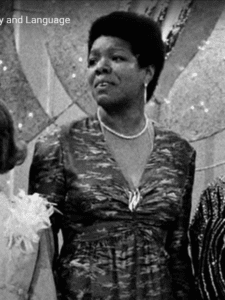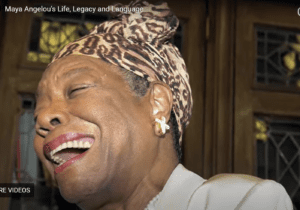The Life of Maya Angelou – Facts About Maya Angelou Answered
You may have heard of Maya Angelou, a prominent figure in American literature. Her legacy spans decades and continues to inspire readers worldwide.
Early Life and Background
Maya Angelou, born Marguerite Annie Johnson, was an American poet, memoirist, and civil rights activist. She was born on April 4, 1928, in St. Louis, Missouri. Angelou had a challenging childhood, as she experienced poverty, racism, and trauma during her early years. Despite these hardships, she found solace in literature and poetry, which would later become her passion and career.

Writing Career
Angelou’s writing career began in the 1950s, where she explored various genres such as poetry, essays, and plays. She gained recognition for her first autobiography, “I Know Why the Caged Bird Sings,” published in 1969. This groundbreaking memoir detailed her childhood struggles and triumphs, garnering critical acclaim and establishing her as a literary force to be reckoned with.
Poetry and Activism
In addition to her prose writing, Angelou was known for her poignant and powerful poetry. Her work often addressed themes of identity, race, and empowerment. Angelou’s activism was also central to her literary endeavors, as she used her platform to advocate for social justice and equality. Through her words, she inspired others to speak out against injustice and pursue a better world for all.
Awards and Recognition
Throughout her career, Maya Angelou received numerous awards and honors for her contributions to literature and activism. She was awarded the Presidential Medal of Freedom in 2010, one of the highest civilian honors in the United States. Angelou’s impact on American culture and society is undeniable, and her legacy continues to influence generations of writers and activists.
Maya Angelou’s Influence on Modern Literature
Maya Angelou’s work has left a lasting impact on modern literature, influencing writers across genres and generations.
Literary Style
Angelou’s writing style is characterized by its lyrical prose, vivid imagery, and emotional depth. Her words have a way of resonating with readers on a personal level, evoking a wide range of emotions and experiences. Angelou’s unique voice and perspective have set her apart as a literary icon, paving the way for future generations of writers to explore themes of identity, resilience, and hope.
Cultural Impact
Angelou’s exploration of race, gender, and social justice in her writing has had a profound impact on modern literature. Her ability to confront difficult topics with honesty and grace has inspired a new wave of writers to tackle similar themes in their work. Angelou’s legacy continues to shape conversations around diversity, representation, and inclusion in literature today.
Cross-Genre Influence
Beyond her impact on literature, Maya Angelou’s work has transcended genres and mediums, influencing music, film, and spoken word poetry. Artists from diverse backgrounds have drawn inspiration from Angelou’s words, incorporating her themes and perspectives into their own creative expressions. Angelou’s influence can be felt across a variety of artistic disciplines, showcasing the universal appeal and relevance of her work.
Educational Legacy
In addition to her literary contributions, Maya Angelou’s legacy extends to the field of education. Her writings are often taught in schools and universities, where they serve as powerful tools for sparking conversations about race, gender, and social justice. Angelou’s storytelling resonates with students of all ages, encouraging them to explore important historical and cultural themes through a personal and relatable lens.

Celebrating Maya Angelou’s Enduring Legacy
Maya Angelou’s legacy continues to inspire and empower readers around the world. Her impact on literature, activism, and culture remains as relevant today as it was during her lifetime.
Community Engagement
Angelou’s influence extends beyond the realm of literature, as she was deeply involved in her community and worked tirelessly to uplift marginalized voices. Her commitment to social justice and civil rights activism serves as a model for how writers can use their platform to effect positive change in the world. Angelou’s legacy reminds us of the power of storytelling to connect people and inspire meaningful action.
Global Reach
Maya Angelou’s work has resonated with readers worldwide, transcending geographical and cultural boundaries. Her message of resilience, empowerment, and hope has touched the hearts of individuals from diverse backgrounds and experiences. Angelou’s ability to convey universal truths through her storytelling has solidified her place as a beloved figure in global literature.

Legacy in Popular Culture
Angelou’s influence can be seen in popular culture, where her words and ideas continue to be celebrated and referenced. From quotes on social media to tributes in film and television, Angelou’s legacy lives on in various forms of media. Her enduring impact on popular culture serves as a testament to the timelessness and relevance of her work.
Continuing Inspiration
As we reflect on Maya Angelou’s enduring legacy, we are reminded of the power of literature to provoke thought, promote empathy, and inspire change. Her words continue to resonate with readers of all ages, inviting us to engage with important social issues and strive for a more just and equitable world. Angelou’s legacy serves as a beacon of hope and resilience in an ever-changing and challenging world.
FAQs About Maya Angelou
1. Who was Maya Angelou?
Maya Angelou was an American poet, memoirist, and civil rights activist best known for her series of autobiographies, including *I Know Why the Caged Bird Sings*.
2. What is Maya Angelou’s real name?
Maya Angelou was born Marguerite Annie Johnson. “Maya” was a nickname given by her brother, and “Angelou” is derived from her first husband’s surname.
3. What are Maya Angelou’s most famous works?
Her most famous works include *I Know Why the Caged Bird Sings*, *Phenomenal Woman* (a poem), and *And Still I Rise*.
4. What themes are central to Maya Angelou’s work?
Her works often explore themes of identity, racism, resilience, womanhood, and the African American experience.
5. How did Maya Angelou contribute to the Civil Rights Movement?
She worked with leaders like Dr. Martin Luther King Jr. and Malcolm X, serving as the Northern Coordinator for King’s Southern Christian Leadership Conference and working with Malcolm X to establish the Organization of Afro-American Unity.
6. What are some of Maya Angelou’s notable achievements?
Maya Angelou was awarded over 50 honorary degrees, a Presidential Medal of Freedom (2011), and a National Book Award nomination for *I Know Why the Caged Bird Sings*.
7. What is Maya Angelou’s most famous poem?
“Phenomenal Woman” is one of her most celebrated poems, known for its empowering message about self-confidence and femininity.
8. Did Maya Angelou act in films or theater?
Yes, she acted in films like *Poetic Justice* and was also a playwright, director, and dancer in the 1950s and 1960s.
9. Why is *I Know Why the Caged Bird Sings* significant?
The book was groundbreaking for its candid discussion of racism, sexual assault, and personal identity, paving the way for more autobiographical works by African American women.
10. What was Maya Angelou’s role at President Bill Clinton’s inauguration?
She delivered her poem *On the Pulse of Morning* at Clinton’s 1993 inauguration, becoming only the second poet in U.S. history to perform at a presidential inauguration.
11. What languages did Maya Angelou speak?
Maya Angelou was fluent in six languages, including French, Spanish, Italian, Arabic, and West African Fanti, in addition to English.
12. What was Maya Angelou’s early life like?
She faced significant hardships, including racism and sexual abuse, which shaped her resilience and inspired much of her later work.
13. How did Maya Angelou impact modern literature?
Her autobiographical style redefined the genre by blending personal narrative with historical context, influencing countless writers.
14. Did Maya Angelou write music?
Yes, she wrote songs, including for *Calypso Heat Wave*, and performed as a calypso singer under the name “Miss Calypso” in the 1950s.
15. How is Maya Angelou remembered today?
She remains an icon of literature and activism, celebrated for her contributions to the arts and social justice. In 2022, she became the first Black woman featured on a U.S. quarter as part of the American Women Quarters Program.

